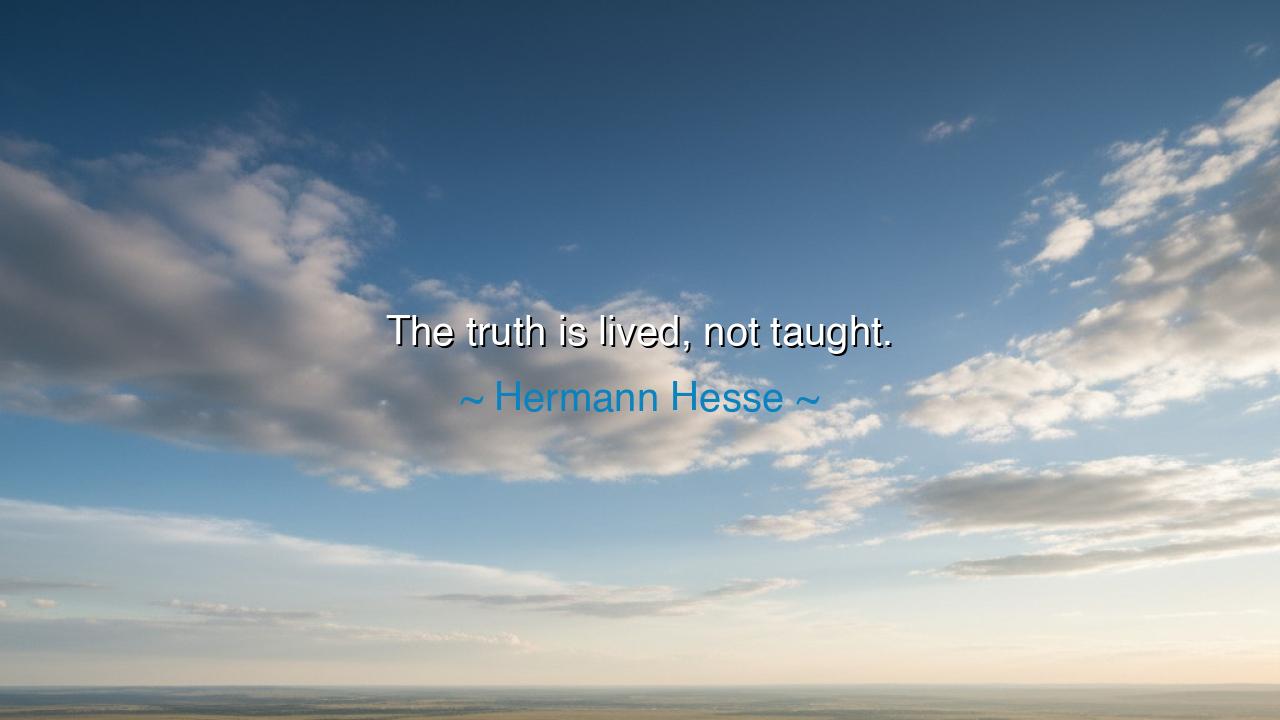
The truth is lived, not taught.






Hear the words of Hermann Hesse, who declared: “The truth is lived, not taught.” In these few syllables lies a teaching as old as the mountains. For truth is not a scroll to be unrolled, nor a lecture to be memorized; it is the breath of life itself. A man may speak endlessly of wisdom, he may write volumes upon volumes, but if his deeds betray his words, then his truth is hollow. Only when a soul shapes its life according to what it proclaims does truth become real, and only then does it pass from shadow into substance.
The ancients understood this. The sages of old did not merely speak about justice—they lived justly. The prophets did not only warn of righteousness—they embodied it, even when it cost them exile or death. To live the truth is far harder than to speak it, for speech demands only breath, but living truth demands blood, sacrifice, and steadfastness. Thus, Hesse reminds us: truth is not a matter of words, but of being.
Consider the life of Socrates, who stood before his accusers in Athens. He could have begged for mercy, twisted his words, or taught clever rhetoric to save himself. But he chose instead to live according to the truth he had always professed: that the examined life is greater than the safe life, and that the soul’s integrity outweighs the body’s survival. He drank the hemlock calmly, proving that the truth he had taught to his disciples was not mere speech but a life embodied. His example burned brighter than his words, for it showed that truth can be lived even unto death.
So too did Mahatma Gandhi live out this teaching in modern times. He did not merely preach nonviolence from a lofty chair; he fasted, suffered imprisonment, and walked among the poor. His truth was not a sermon, but a life of simplicity, discipline, and sacrifice. India was not moved by philosophy alone, but by the sight of one man embodying his convictions with every breath. Gandhi’s life teaches us that words may stir for a moment, but the life lived in truth moves generations.
We see, then, that truth without embodiment is fragile. A teacher who does not live by his lessons becomes a mockery; a leader who does not practice his promises becomes a tyrant. But the one who lives truth needs no long speeches, for his life itself is a sermon. The greatest teachings are carved not into stone, but into the actions of men and women who refuse to betray their convictions.
What lesson shall we take, O child of tomorrow? Do not be content to speak of kindness—be kind. Do not only praise honesty—speak and act honestly. Do not merely admire courage—stand firm when fear calls you to flee. For every truth that you admire in the mouths of others must be tested in your own life, or it remains but a shadow, never substance.
And so let this wisdom be your guide: the truth is lived, not taught. Do not seek to become a preacher of words, but a witness of life. Let your deeds shine more brightly than your tongue. And if you stumble, rise again, for the living of truth is not perfection, but persistence. Walk in this way, and your life itself will become a lamp to others, a teaching more powerful than any book, a legacy that endures when all words are forgotten.






HVHoang Vinh
Hermann Hesse's statement evokes the idea that truth is more than just an abstract concept. It’s something we must actively engage with in the real world. But this raises a question: can we truly live our truth if we haven’t been exposed to multiple perspectives or teachings? Is there an inherent value in being taught, or is it only through action and experience that truth becomes meaningful?
DQDAO NGOC DIEU QUYEN
The idea that truth is lived and not taught seems to point to the importance of personal experience in understanding deeper realities. But if truth is something we must live, how do we know we’re truly living it? Is there a danger in confusing our own perceptions with truth itself? How do we avoid the trap of believing our personal truth is universal for everyone?
SMSong May
Hesse’s quote implies that truth isn’t static—it’s something we embody and express through our actions. But what happens when two people live their truth in different ways? Can they still find common ground if their experiences don’t align? This idea also raises questions about how we define ‘living the truth’—is it based purely on personal experiences, or is there an objective truth that everyone should strive for?
TTTong Thanh Tuyen
Living the truth, as Hesse says, suggests a kind of authenticity that comes from one’s personal journey. But does this mean we need to go through every possible experience to uncover truth? It makes me wonder: is there ever a point where living the truth stops being about personal growth and starts being about connecting with the larger community? How do we ensure that our personal truths align with the broader societal truths?
TNThanh Thao Nguyen
This quote resonates with the idea that personal experience and introspection lead to a deeper understanding of truth than formal teachings. It makes me wonder, though—does this mean that truth is subjective and unique to each individual? If truth is lived and not taught, can it be communicated or shared in a way that others can understand? Can we really trust personal experience alone, or do we need external validation?